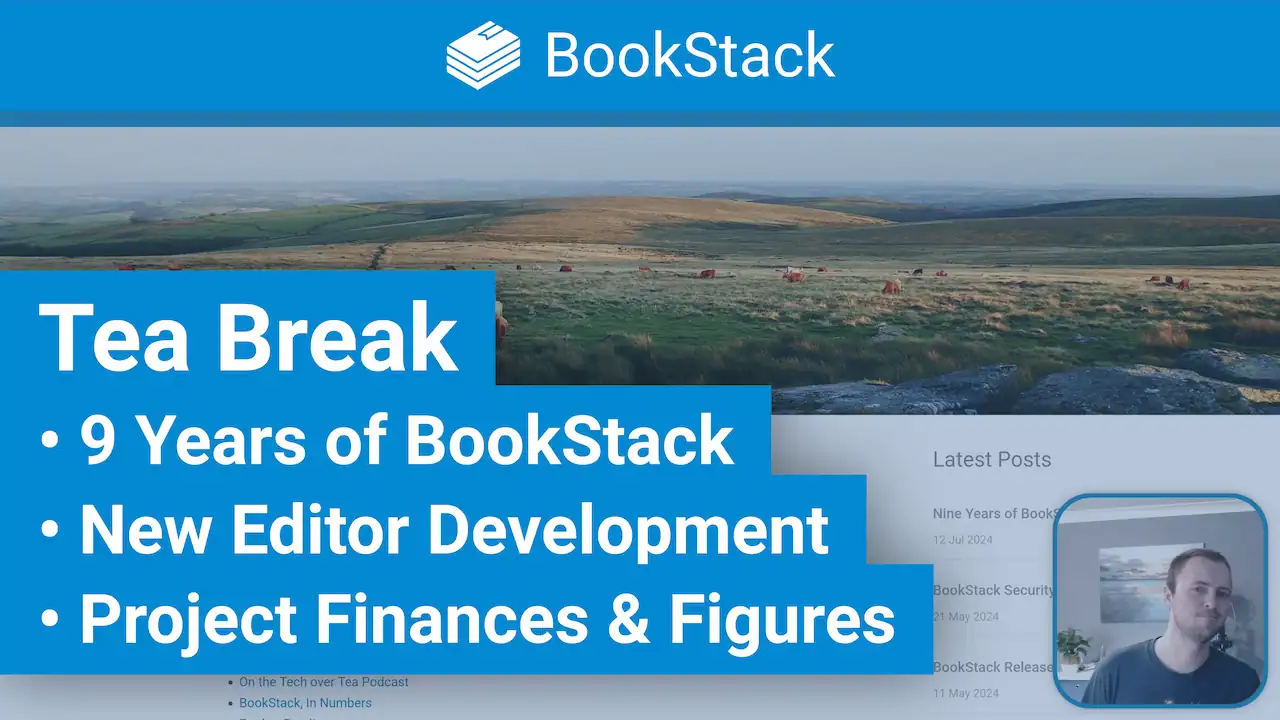Nine Years of BookStack
![]() Dan Brown posted on the 12th of July 2024
Dan Brown posted on the 12th of July 2024
Today the BookStack project becomes 9 years old! Like last year’s post, and the years before it, we’ll take this as an opportunity to provide an update on the status of the project including the financials, current development status, and the growth figures.
Financials
Below is the general high level financial monthly breakdown of my BookStack revenue sources (excluding costs, fees, taxes etc…) ranging from the start of 2022 until now:
As you can see, this year’s finances have gotten off to quite a good comparable start, with March and June reflecting large income spikes from support services. This is mainly thanks to a couple of businesses purchasing our enterprise support option which is priced at £4,500 per year. Upon that, the renewals and sign-ups for our professional support plan (£450/y) have helped continue to establish a nice recurring base income via support services.
Donations and sponsorships across KoFi & GitHub sponsors has grown slightly when looking at the past 12 months, averaging about £1,328/m compared to the £1,211/m for the 12 months before that. In addition to some one-off donations, many of these are recurring yearly or monthly, which serves as a very welcome stable base of income.
Overall, these increases mean that at 6 months into 2024, I’ve almost reached the level of income received for the whole of 2023. Thank you so much to all donators, sponsors, and those who support by purchasing the BookStack support offerings. The kind support from such folks has helped to assure a stable income source for me as I continue to work on BookStack.
Currently I donate to open source services & libraries I use to help build BookStack, but this is rather minimal (~£100 per month) since I somewhat put it on pause a few years ago when leaving my last job to work on BookStack full time. Now that I’m due to more than cover my living costs, later this year I plan to re-assess this element to scale this up again to help support & sustain the other projects we rely upon.
Project Status Update: New Editor
Right now my main efforts are in attempting to build an new editor for pages (and description/comment inputs) to replace our existing WYSIWYG editor, based upon TinyMCE, which changed licenses earlier this year.
This new editor is built using lexical as a foundation, but every part of the UI is custom-built. So far this is going okay, but there’s still a fair way to go. My aim is to initially match the existing WYSIWYG editor in both functionality and general UI, and then we can improve & build upon this in future when things are stable to fully take advantage of the control and features that we’d gain from this new editor. There ultimately will be an element of breaking change, especially in lesser trodden edge-case scenarios, but I want to make this minimal.
My plan is to introduce the editor as an additional non-default editor option in alpha status, then switch that to beta status after a round of feedback and fixes (still non-default), then change the default WYSIWYG option to the new editor once things are stable (leaving the old editor as an option for a few releases) before eventually removing the old editor after a few releases of stable overlap.
If you’d like to see the progress so far, I show off the current state in my video here (starting at around 3:30):
The work on the editor for an initial release will take a while longer though so I’ll probably look to extend out the current feature release further than usual with some extra patch releases.
On the Tech over Tea Podcast
In June I spoke to Brodie Robertson on his Tech Over Tea podcast. This was mainly to talk about open source, and a blogpost I had written to Futo regarding their attempts to change what open source means, but we also talk about BookStack and specifically I touch on many of my thoughts in regards to licensing around BookStack:
BookStack, In Numbers
Like we do on each BookStack birthday, we’ll dive into the numbers once again to see how BookStack has grown over the past year.
The below figures were collected at the time of writing (8th July 2024), with changes in red/green reflecting change upon last year’s numbers.
GitHub Figures
- 14,310 GitHub stars +2,494
- 1,810 forks on GitHub +266
- 5,106 GitHub issues and PRs opened +728
- 3,669 GitHub issues closed (+488), 540 currently open (+139)
- 190 releases published +22
Code Repository Stats
- 4,594 commits +466
- 175 direct git contributors +18
Social
- 3,553 Discord members +414
- 1,562 Subreddit members +588
- 2,188 YouTube channel subscribers +778
- 40 PeerTube channel followers +40
- 620 Twitter Followers +123
- 556 Mastodon Followers +321
Website Analytics
Main bookstackapp.com site only, Averaged over last 90 days:
- 1,417 unique users per day +187
- 3,542 page views per day +337
- Operating system breakdown:
- 55% Windows
- 18% Mac
- 9% Android -1%
- 9% Linux -1%
- 8% iOS/iPadOS +1%
Our full website analytics can be found here.
CrowdIn (Project Translations) Numbers
- 46 languages +4
- 8,059 words to translate +887
- 337 project members +48
Thoughts on the Numbers
Like last year, no major surprises here really. It’s good to see continued steady growth in general across most of these figures, even though I’ve put very little effort into any kind of marketing & outreach in the last year. I was concerned these may slip, as BookStack becomes a more mature/stable project which doesn’t make headlines via big new additions or from being a newly launched project, but growth has retained which is great.
Further Reading
Here are the non-release/update posts that you may have missed over the last year:
Header Image Credits: Photo by Herbythyme (CC-BY-4) - Image Modified


